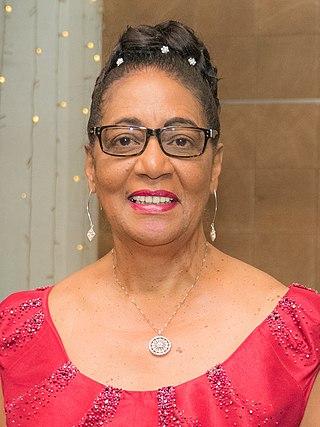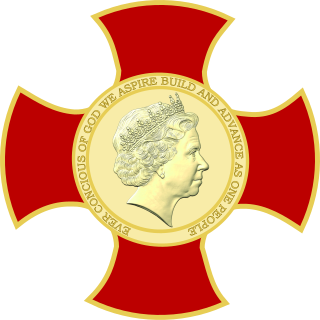
The governor-general of Australia is the federal representative of the monarch of Australia, currently Charles III. The governor-general has many constitutional and ceremonial roles in the Australian political system, in which they have independent agency. However, they are generally bound by convention to act on the advice of the prime minister and the Federal Executive Council. They also have a significant community role, through recognising meritorious individuals and groups, and representing the nation as a whole. The current governor-general is Sam Mostyn.

The Parliament of Canada is the federal legislature of Canada, seated at Parliament Hill in Ottawa, and is composed of three parts: the King, the Senate, and the House of Commons. By constitutional convention, the House of Commons is dominant, with the Senate rarely opposing its will. The Senate reviews legislation from a less partisan standpoint and may initiate certain bills. The monarch or his representative, normally the governor general, provides royal assent to make bills into law. According to Section 16 of the Canadian Charter of Rights and Freedoms, the official languages of the parliament are English and French.

The governor-general of Papua New Guinea is the representative of the Papua New Guinean monarch, currently King Charles III, in Papua New Guinea. The governor-general is appointed by the monarch after their nomination by the National Parliament by vote. The functions of the governor-general include appointing ministers, judges, and ambassadors; and issuing writs for election.

The governor-general of Belize is the representative of the Belizean monarch, currently King Charles III, in Belize. The governor-general is appointed by the monarch on the recommendation of the prime minister of Belize. The functions of the governor-general include appointing ministers, judges, and ambassadors; giving royal assent to legislation passed by the National Assembly; and issuing writs for election.

The governor-general of Jamaica is the representative of the Jamaican monarch, currently King Charles III, in Jamaica. The governor-general is appointed by the monarch on the recommendation of the prime minister of Jamaica. The functions of the governor-general include appointing ministers, judges, and ambassadors; giving royal assent to legislation passed by parliament; issuing writs for election.

The governor-general of Saint Lucia is the representative of the Saint Lucian monarch, currently King Charles III, in Saint Lucia. The governor-general is appointed by the monarch on the recommendation of the prime minister of Saint Lucia. The functions of the governor-general include appointing ministers, judges, and ambassadors; giving royal assent to legislation passed by parliament; issuing writs for election.

The president of the Republic of Trinidad and Tobago is the head of state of Trinidad and Tobago and the commander-in-chief of the Trinidad and Tobago Defence Force. The office was established when the country became a republic in 1976, before which the head of state was the Queen of Trinidad and Tobago, Elizabeth II. The last governor-general, Sir Ellis Clarke, was sworn in as the first president on 1 August 1976 under a transitional arrangement. He was formally chosen as president by an electoral college consisting of members of both houses of Parliament on 24 September 1976, which is now celebrated as Republic Day.

The governor-general of The Bahamas is the representative of the Bahamian monarch, currently King Charles III, in the Commonwealth of The Bahamas. The governor-general is appointed by the monarch on the recommendation of the prime minister of The Bahamas. The functions of the governor-general include appointing ministers, judges, and ambassadors; giving royal assent to legislation passed by parliament; issuing writs for election.

The governor-general of Solomon Islands is the representative of the Solomon Islands' monarch, currently King Charles III, in Solomon Islands. The governor-general is appointed by the monarch after their nomination by the National Parliament by vote. The functions of the governor-general include appointing ministers, judges, and ambassadors; giving royal assent to legislation passed by parliament; and issuing writs for election.

The governor-general of Ceylon was the representative of the Ceylonese monarch in the Dominion of Ceylon from the country's independence in 1948 until it became the republic of Sri Lanka in 1972.

The monarchy of Antigua and Barbuda is a system of government in which a hereditary monarch is the sovereign and head of state of Antigua and Barbuda. The current Antiguan and Barbudan monarch and head of state, since 8 September 2022, is King Charles III. As sovereign, he is the personal embodiment of the Crown of Antigua and Barbuda. Although the person of the sovereign is equally shared with 14 other independent countries within the Commonwealth of Nations, each country's monarchy is separate and legally distinct. As a result, the current monarch is officially titled King of Antigua and Barbuda and, in this capacity, he and other members of the Royal Family undertake public and private functions domestically and abroad as representatives of Antigua and Barbuda. However, the King is the only member of the Royal Family with any constitutional role.

The governor-general of New Zealand is the representative of the monarch of New Zealand, currently King Charles III. As the King is concurrently the monarch of 14 other Commonwealth realms and lives in the United Kingdom, he, on the advice of his New Zealand prime minister, appoints a governor-general to carry out his constitutional and ceremonial duties within the Realm of New Zealand.

The monarchy of Jamaica is a system of government in which a hereditary monarch is the sovereign and head of state of Jamaica. The current Jamaican monarch and head of state, since 8 September 2022, is King Charles III. As sovereign, he is the personal embodiment of the Jamaican Crown. Although the person of the sovereign is equally shared with 14 other independent countries within the Commonwealth of Nations, each country's monarchy is separate and legally distinct. As a result, the current monarch is officially titled King of Jamaica and, in this capacity, he and other members of the royal family undertake public and private functions domestically and abroad as representatives of the Jamaican state. However, the monarch is the only member of the royal family with any constitutional role.

The monarchy of the Bahamas is a system of government in which a hereditary monarch is the sovereign and head of state of the Commonwealth of The Bahamas. The current Bahamian monarch and head of state, since 8 September 2022, is King Charles III. As sovereign, he is the personal embodiment of the Bahamian Crown. Although the person of the sovereign is equally shared with 14 other independent countries within the Commonwealth of Nations, each country's monarchy is separate and legally distinct. As a result, the current monarch is officially titled King of the Bahamas and, in this capacity, he and other members of the royal family undertake public and private functions domestically and abroad as representatives of the Bahamian state. However, the King is the only member of the Royal Family with any constitutional role.

The monarchy of Grenada is a system of government in which a hereditary monarch is the sovereign and head of state of Grenada. The current Grenadian monarch and head of state, since 8 September 2022, is King Charles III. As sovereign, he is the personal embodiment of the Grenadian Crown. Although the person of the sovereign is equally shared with 14 other independent countries within the Commonwealth of Nations, each country's monarchy is separate and legally distinct. As a result, the current monarch is officially titled King of Grenada and, in this capacity, he and other members of the royal family undertake public and private functions domestically and abroad as representatives of Grenada. However, the King is the only member of the royal family with any constitutional role.

The monarchy of Saint Kitts and Nevis is a system of government in which a hereditary monarch is the sovereign and head of state of Saint Kitts and Nevis. The current monarch of Saint Kitts and Nevis, since 8 September 2022, is King Charles III. As sovereign, he is the personal embodiment of the Crown of Saint Kitts and Nevis. Although the person of the sovereign is equally shared with 14 other independent countries within the Commonwealth of Nations, each country's monarchy is separate and legally distinct. As a result, the current monarch is officially titled King of Saint Christopher and Nevis and, in this capacity, he and other members of the royal family undertake public and private functions domestically and abroad as representatives of Saint Kitts and Nevis. However, the King is the only member of the royal family with any constitutional role.

The monarchy of Tuvalu is a system of government in which a hereditary monarch is the sovereign and head of state of Tuvalu. The current Tuvaluan monarch and head of state since 8 September 2022 is King Charles III. As sovereign, he is the personal embodiment of the Tuvaluan Crown. Although the person of the sovereign is equally shared with 14 other independent countries within the Commonwealth of Nations, each country's monarchy is separate and legally distinct. As a result, the current monarch is officially titled King of Tuvalu and, in this capacity, he and other members of the royal family undertake public and private functions domestically and abroad as representatives of the Tuvaluan state. However, the King is the only member of the royal family with any constitutional role.

Dame Cécile Ellen Fleurette La Grenade, is a Grenadian food scientist who has served as governor-general of Grenada since 2013.

The Order of Grenada is a society of honour instituted through the Grenada National Honours Act of 1994. The Order was subsequently reconstituted and substantially reformed by the National Honours and Awards Act of 2007.

The Grenada Monarchist League (GML) is an unincorporated nonprofit organisation in Grenada, promoting and educating on the Grenadian monarchy and Constitution. The organisation was founded on 7 February 2024, in response to increased pressures of republicanism among politicians in Grenada following the death of Queen Elizabeth II and the country's Golden Jubilee of independence.


































